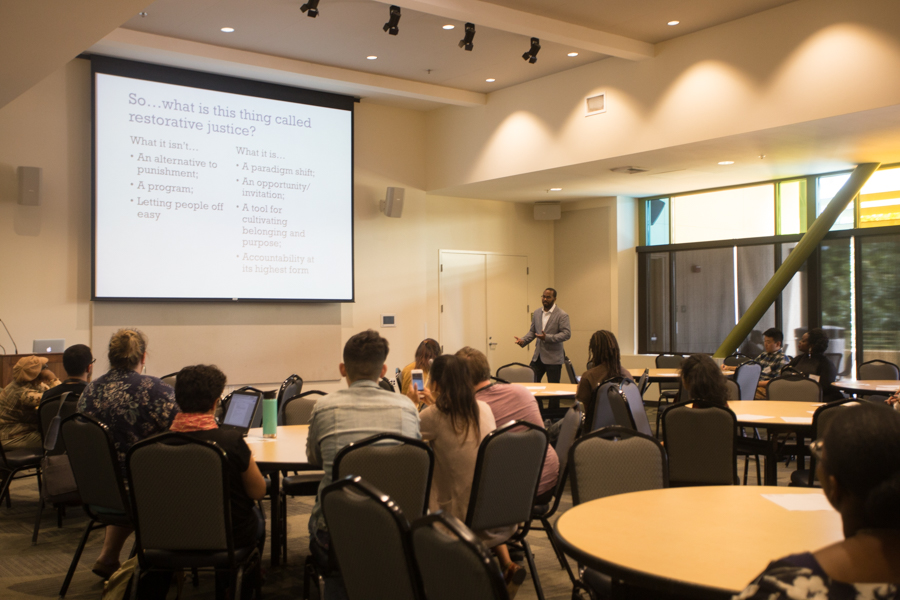
IEJS brings students, professionals together to get involved in environmental justice activities
The Interdisciplinary Environmental Justice Symposium brought together community members, professionals, students and researchers to discuss methods of improving environmental health in vulnerable populations. The event was organized by Joelle Toney and Alexandria Igwe, the special events coordinator and student director of the GAAAP program, respectively.
“I wanted to create an event that would elevate marginalized voices as well as bring together people who are not normally in the same room to discuss their approaches to addressing environmental degradation and the uneven effects it has on our communities and planet,” said Toney, a fifth-year community and regional development student. “All too often, we are zoomed into just one aspect of an issue — not realizing that we can create alliances and collaborate with people who are trying to solve the same issue but from a different perspective.”
Breakfast was followed by brief welcoming remarks and the first three breakout sessions. One session was the Water Is Life panel, detailing the ways in which Native American and indigenous people consider water sources as entities intimately tied to the health of human populations. Kaitlin Reed, a Ph.D. candidate in Native American studies, discussed the problems the Yurok tribe is facing due to illegal Northern California marijuana growers polluting crucial Yurok waterways around Humboldt County with pesticides and human waste.
“For indigenous communities, when we’re talking about environmental justice, we have to talk about settler colonialism, what that is, and how its legacy is still produced today,” Reed said. “Unless environmental justice talks about decolonization in its own way, it’s not going to make sense or be effective for indigenous communities.”
Keynote speaker Margaret Gordon described her work with the West Oakland Environmental Indicators Project, in which citizens were equipped with air monitors to measure how severe the air pollution was in their Oakland neighborhoods. Gordon detailed how an Oakland highway was rerouted outside of residential areas due to the air monitoring data collected by her teams.
“Citizen science gives you the ability to have your own evidence,” Gordon said to the audience.
The second set of three breakout sessions included the Sustainable Agriculture Panel. UC Davis alumnus Karishma Sethi detailed her work in Brazil as the founder of Saúde, Educação, Renda, which is Portuguese for “health, education and income.”
“I was able to put together this idea of incorporating hydroponics to grow plants with the concept of food as medicine, bringing that to a population that suffers severely from diabetes,” Sethi said.
Igwe mentioned that studying how plants absorb heavy metals from the soil could be a way to revitalize areas near factories, ports and other pollution sources. Such areas have been contaminated with materials that are harmful to both humans and the environment like lead, nickel and cadmium.
“One way I hope to change that is through the work with plant-microbe interactions — using more plant-based remediation techniques in urban areas where there are a lot of brownfields and contaminated lands,” said Igwe, a third-year Ph.D. candidate in the microbiology department.
Other sessions included Fashion’s Contribution to Pollution and a Restorative Justice Workshop with Cal EPA. The event concluded with closing remarks from Lawrence Torry Winn, the co-director of Transformative Justice in Education Center at UC Davis. Time was available for networking and conversations about what the attendees and panelists learned from each other during the day.
“The idea is that an event like this would allow students to be able to contextualize their work in the broader sense of what’s going on with people who aren’t in academia and what’s happening in the community,” Igwe said. “They could better identify what they want to do with research or identify places where they would like to work, volunteer or connect with.”
Written by: George Ugartemendia — science@theaggie.org



